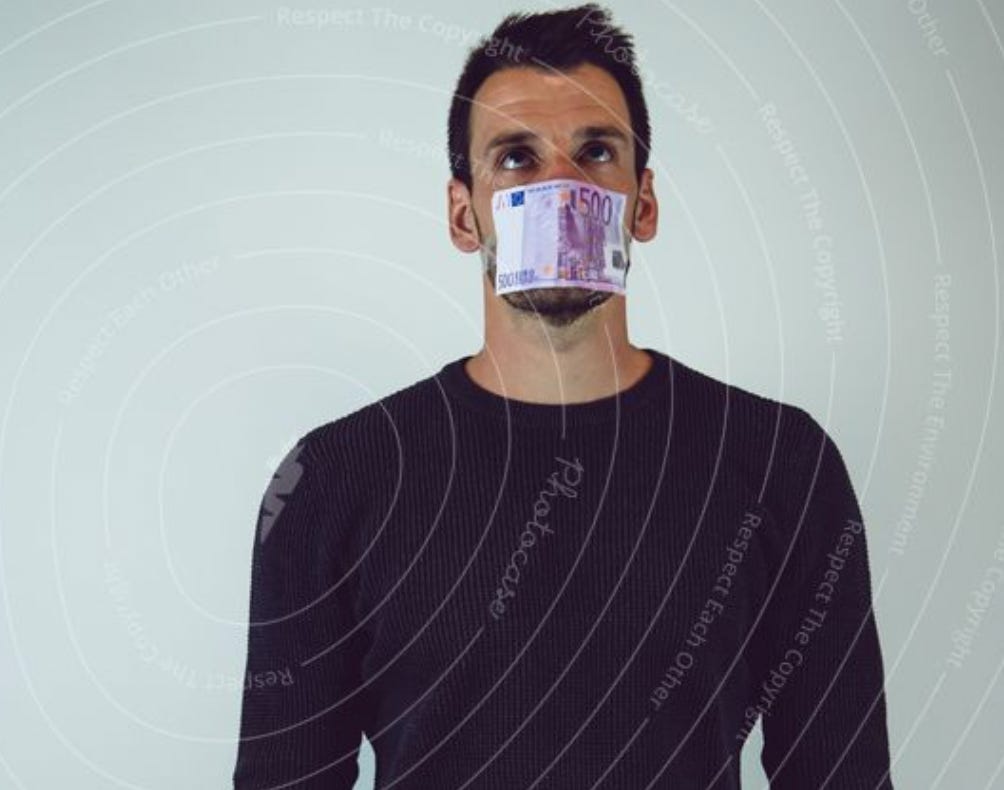What the hell is greenhushing?
Everything you ever needed to know and how to avoid it
*** Please note that today’s newsletter will be illustrated solely by stock photo images of random people shushing each other to bring extra joy ****
Unless you’ve been living under a slab of basalt, you know what greenwashing is. Greenhushing on the other hand, is much more stealth, literally and metaphorically.
In summary, Greenhushing is like when your boss asks you to do a big project, but you’re really out of your depth, have no idea what’s going on, and you try to hide the results in the hope she never mentions it again. It’s not that companies who practice greenhushing do it to deliberately mislead, but it can certainly be easier to avoid scrutiny if you just don’t mention your sustainability efforts.
Coined by consultancy firm, Treehugger, the term describes companies who are hesitant to celebrate their sustainability initiatives, and is directly opposite to the concept of greenwashing, where companies brag about their achievements.
Greenhushing may come from a place of fear - of not investing enough time, education or effort into learning what sustainability processes are necessary in your sector. This can then manifest in a reluctance to share achievements.
Why greenhush?
A 2017 academic paper by Xavier Font summarises that greenhushing can actually result in greater scrutiny. By pushing certain topics to the front and ignoring others, businesses are at risk of people asking: ‘why’.
the communication itself represents sustainability problems as symbolic action (Bourdieu, 2012; Burke, 1966), i.e. as language that orients us to seeing things in a certain way. Situations are presented as meaningful by the way they bring certain elements to the fore, whilst pushing some to the back, and completely removing others. Greenhushing: the deliberate under communicating of sustainability practices by tourism businesses, Xavier Font, Islam Elgammal &Ian Lamond
Greenhushing may also come about as a result of being a small organisation and being unable to commit to legal checks or work with global certification. These can be expensive to obtain and commit reporting for. However, smaller companies can also post or talk openly about these prohibitive costs or expectations, and that can drive awareness to provide subsidies.
Why’s greenhushing so bad?
A kind take: Greenhushing isn’t necessarily bad, but one of the vital components of communicating sustainability is to inspire customers and stakeholders to take responsibility within their own sphere of influence. If, by not talking about your achievements, you’re not doing that, then you’re missing a trick.
A less kind take: Greenhushing can sometimes be calculated by companies who want to avoid public scrutiny. An oil company refusing to share any of their sustainability practices (even if they are actually on their Net Zero journey) could be a good example of this. It takes time to build trust and confidence in a company’s climate journey, especially if they already have a problematic reputation.

Why you should avoid greenhushing?
The UN’s Sustainable Development Goals (SDGs) states that companies should be transparent with their sustainable initiatives. Think about the impact your practices could have on others in the field. Luxiders magazine, who wrote a piece on greenhushing, says: “corporations set a standard for other companies in the same field. Gucci, Versace, and Michael Kors all recently went fur-free, which they wouldn’t have considered if Calvin Klein had not gone fur-free in the 2000s.”
It’s also counter-intuitive. If you’re really putting the work in, then celebrate it. Take budget from another part of the business and drill it into your sustainability team.
What to do if you think your company is greenhushing?
Perhaps you’re in a comms team and you want to post tweets celebrating COP27 but your organisation doesn’t want to flag attention to the event? Instead they make you create a social strategy with pictures from the CEO’s latest holiday to Bermuda, or a thoughtleadership post about ‘teamwork, guys!’. This could be a sign that your company is involved in greenhushing.
Remember, it’s nothing sinister, but worth a flag. Maybe arrange a meeting with the exec or a comms director, and present them with these stats:
A study by World Economic Forum found that Gen Z cares about sustainability more than any other generation, and they expect brands to show responsibility and accountability by cleaning up their emissions and exploitation records. Stay silent, lose customers.
81% say they prefer to buy from sustainable sellers.
During crises, a company’s sustainability credentials matters.
Check your claims and then check them again. Many companies who greenhush are afraid of being accused of greenwashing. So just don’t make outlandish claims or try to divert your audience’s attention from real, genuine day-to-day ticks on your business’s own and personal climate journey. If you’re getting that right - do better, do more, get your ducks in line, be transparent about your emissions - you can afford to speak out on sustainability.
The (sustainable) world this week
A bank with a backbone
Some great, non-greenhushing news! Lloyds Banking Group have vowed to stop financing new oil and gas projects.
A legal firm with a backbone
Law firm Shoosmiths have announced they will fine lawyers who choose to use plane on business trips. The firm “has imposed a £200 “levy” on lawyers if they jump on an aircraft for meetings. The money raised will be channelled into a carbon fund devoted to turning the firm green.” If the firm are also turning down contracts to work on oil and gas clients and doing pro-bono work for climate charities, then we commend them further!
Plastics are here to stay
A new Greenpeace report reveals that just 5% of plastic gets recycled in the US. Americans discarded 51m tons of wrappers, bottles and bags in 2021 – about 309lb of plastic per person – of which almost 95% ended up in landfills, oceans or scattered in the atmosphere in tiny toxic particles.
Anti-lobbying biodiversity
Think-tank InfluenceMap have found that 89% of engagement by leading industry associations in Europe and the US is designed to delay, dilute and block progress on tackling the biodiversity crisis, which scientists say is as serious as the climate emergency
Thank you for reading PR for the Planet. I’d love you to subscribe and stay abreast of climate news, climate thought, and the best ways to communicate climate.








